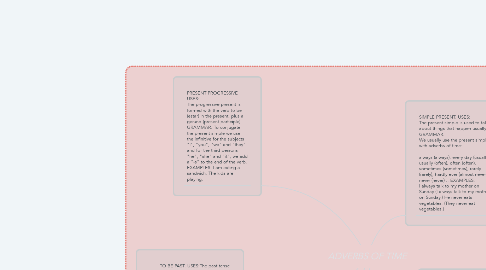ADVERBS OF TIME
von Jazmin Torres

1. PRESENT PROGRESSIVE USES: The progressive present is formed with the verb to be (estar) in the present, plus a gerund (present participle). GRAMMAR: To conjugate the present simple we use the infinitive for the subjects "I", "you", "we" and "they" and for the third persons "he", "she" and "it", we add a "-s" to the end of the verb. EXAMPLES: I am eating a sandwich. The kids are playing.
2. TO BE PAST. USES:The past tense of To Be in English has two forms: WAS and WERE. GRAMMAR: Before the verb you can also have a WH- Question word (Why, Who, What, Where etc.) EXAMPLES: Were you happy? Yes, I was. Why were you happy? Because I was promoted at work.
2.1. TO BE PAST.
3. FUTURE GOING TO : USES : The use of "going to" to refer to future events suggests a very solid link with the present. The precise moment is not relevant, it is later than now GRAMMAR, When we use "going to" in a sentence to refer to the future, the construction is composed of three elements: the verb "to be" conjugated according to the subject + "going" + the infinitive of the main verb EXAMPLES :He's going to be a brilliant politician. I'm going to have a hard time falling asleep.
4. SIMPLE PRESENT. USES: The present simple is used to talk about things that happen usually. GRAMMAR: We usually use the present simple with adverbs of time: always (always), every day (usually), usually (often), often (often), sometimes (sometimes), rarely (rarely), hardly ever (almost never), never (never) .. EXAMPLES: I always talk to my mother on Sunday (I always talk to my mother on Sunday.) He never eats vegetables. (They never eat vegetables.)
5. SIMPLE PAST. USES: Use the simple past to express the idea that an action started and finished at a specific time in the past. Sometimes, the speaker may not actually mention the specific time, but they do have one specific time in mind. GRAMMAR: The simple past is a verb tense that is used to talk about things that happened or existed before now. EXAMPLES: You worked very hard last week.She lived in Japan last year.


